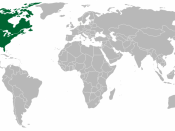Introduction:
Everyone trades in their everyday life. Using money as a means of exchange, we trade goods and services with others in order to have what we cannot provide for ourselves. An individual prevented from trading would have a very low standard of living as they would have to be self-sufficient. We would all agree that letting your neighbor the carpenter build your deck, while you, the accountant complete his tax returns is smart. Sure, either one of these two individuals could do both, taxes and deck building, but by trading, they achieve both more efficiently.
Neighboring countries may also benefit from trade. In 1993, three neighbor nations, Canada, Mexico and the United States entered into the North American Free Trade Agreement ("NAFTA"). This agreement provides for the phased removal of barriers to trade and investment among the three nations. The agreement identifies 61 specific professional-service categories as being eligible for U.S.,
Mexican, or Canadian employment. (Heizer & Render, 2001)
Trade and Comparative Advantage
The benefits of trade have been recognized, studied, evaluated and critiqued for centuries. Comparative advantage shows why the international division of labor is beneficial to all. It states that every country can improve its welfare by specializing in the most efficient lines of production open to them, those in which they have a comparative advantage. The most efficient lines of production are those in which a country's productivity relative to others is greatest. This being the case, why are there any restrictions (barriers) on trade? Why doesn't NAFTA allow the free migration of labor?
While we might all agree that trade is beneficial, the type, manner and scope of trade is subject to great controversy and debate. Limiting our discussion to labor issues within the North America free trade area, we see that the vast difference...


